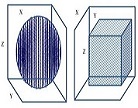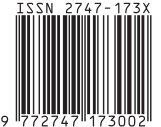Magnetic Susceptibility of Ferromagnetic Alloy Material Co (1-x) Ni (x) Nanocube and Nanosphere Models
DOI:
https://doi.org/10.19184/cerimre.v2i2.28539Abstract
A hard disk is a data storage medium composed of a thin layer of magnetic material. Hard drives take advantage of the characteristics of magnetic materials that are stable to heat and have sensitivity to magnetic fields. One of the best materials to use a thin layer ferromagnetic on a hard disk is CoNi alloy. Hard drives with larger storage capacities require magnetic materials with high magnetic susceptibility values and Curie temperatures to obtain the best magnetic properties. The magnetic susceptibility of alloy ferromagnetic material Co (1- x) Ni (x) nanocube and nanosphere is calculated using vampire-based micro magnetic simulation. The research was conducted using a literature review on the parameters of the CoNi alloy material, and then it was simulated in the vampire program. The data generated from the simulation are magnetic susceptibility (1/tesla) and temperature (K). The spectrum of the magnetic susceptibility graph that shifts to the right as the Ni (x) composition decreases, it is assumed that the higher Curie temperature is produced. Otherwise, The increase in Ni (x) composition causes the magnetic susceptibility spectrum to shift to the left, with the Curie temperature's predicted value getting minor than the other. The nanocube-shaped material has a higher susceptibility value than the nanosphere-shaped material in terms of each Ni (x) composition variation at its maximum magnetic susceptibility.








